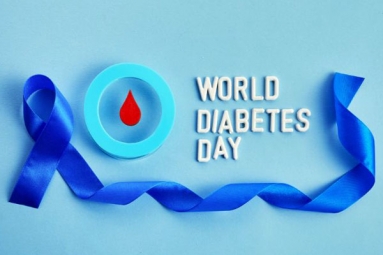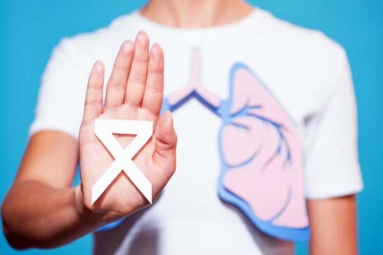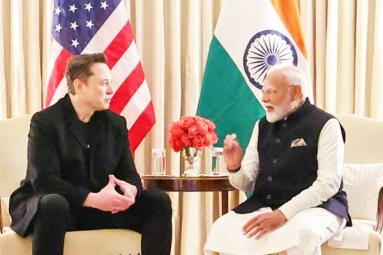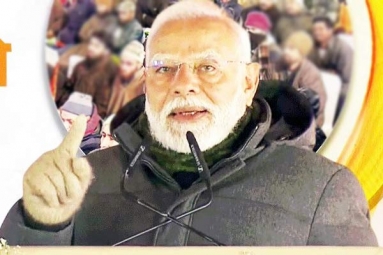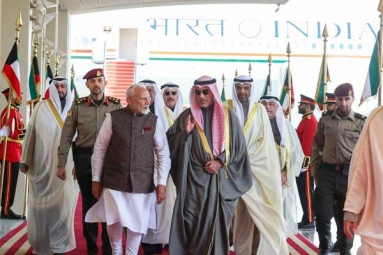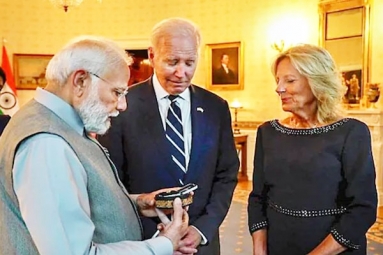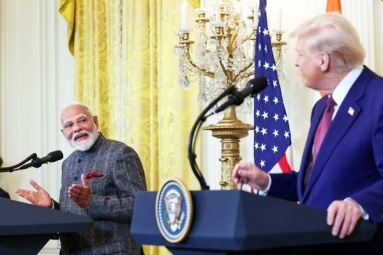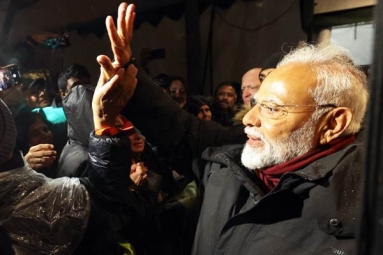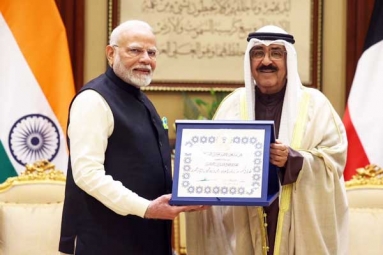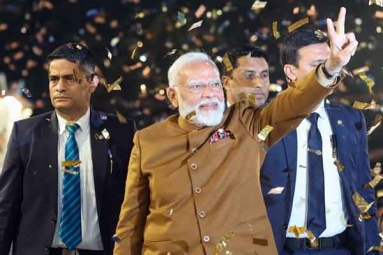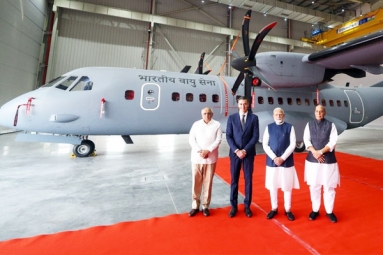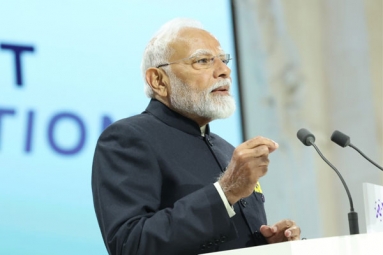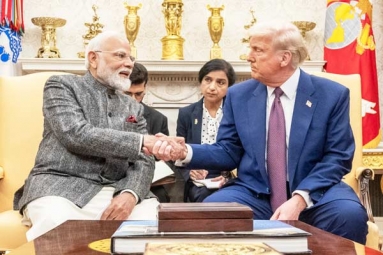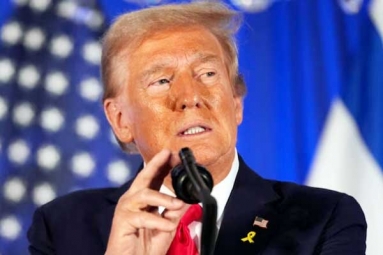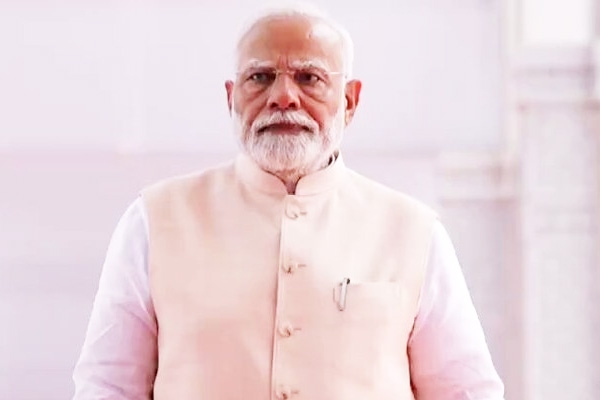
(Image source from: Twitter.com/BJP4India)
Narendra Modi has served in public office for 23 years, during which he has implemented a series of ambitious programs and initiatives that are widely recognized as transformative, first in Gujarat and then across India. His tenure has been marked by bold actions, technological advancements, and a redefinition of India's global standing. Modi's approach to governance has emphasized citizen engagement, known as "Jan Bhagidari," where he involves citizens in the development process to turn initiatives into mass movements. This fundamental principle has enabled him to drive sweeping changes in Gujarat, which previously faced water scarcity and power shortages, as well as across India, which has been navigating a technological revolution and global upheavals due to conflicts, a pandemic, and trade disruptions.
Modi's rise to national leadership was built on his accomplishments in Gujarat, where he implemented reforms known as the 'Gujarat Model'. This approach focused on infrastructure development, business-friendly policies, and efficient governance, which became the foundation for his national agenda. One of the key elements of Modi's legacy in Gujarat was the Sujalam Sufalam Yojana, a comprehensive water management project that transformed the water-scarce state into a water-surplus one. This initiative served as the basis for the national Jal Jeevan Mission, which aims to provide tap water to all rural households by 2024. Similarly, the Jyotigram Yojana, which provided 24-hour electricity to all 18,000 villages in Gujarat, became the model for the national Saubhagya Scheme, targeting universal household electrification.
As Prime Minister, Modi, now 74 years old, has emphasized digital transformation, technological advancement, boosting manufacturing and self-reliance, focusing on India's villages and farmer welfare, water conservation, and initiatives to improve public health and sanitation. Among the significant economic reforms he introduced was the Goods and Services Tax (GST) in 2017. The tax system, although not without difficulties in its application, is intricate and multifaceted. The “Make in India” initiative was launched in 2014 with the aim of making India a global manufacturing hub. While the program has had mixed results, it has helped increase foreign direct investment (FDI) and improve ease of doing business rankings. In response to the economic challenges posed by the coronavirus pandemic, Prime Minister Modi launched the 'Atmanirbhar Bharat' (Self-Reliant India) 2020 campaign. This initiative along with the Production Linked Incentive (PLI) scheme targeting 14 key sectors to stimulate economic growth in the country. Strengthening production and reducing dependence on imports. To support these objectives, the government has launched a Production Linked Incentive (PLI) program targeting 14 key sectors with an investment of Rs 1.97 billion. These efforts appear to have contributed to India's economic growth by increasing the country's gross domestic product and causing foreign direct investment to peak.
For example, the Digital India Mission expanded internet access and digital literacy across the country. The Unified Payments Interface (UPI) has revolutionized digital transactions, making India a leader in real-time payments and providing several countries in the Global South with a payment method without relying on multinational payment aggregators. Digital India is also central to the government's financial inclusion efforts, boosted by the opening of 533 million bank accounts through the Prime Minister's Jan Dhan Yojana. India's poverty rate fell from 55.1 percent in 2005 to 16.4 percent in 2021, lifting 415 million people out of poverty. The digital push also includes StartUp India. Startup India has built a vibrant startup ecosystem with over 140,000 certified startup companies and the creation of over 1.5 million direct jobs. Another issue close to Mr Modi's heart is health. Swachh Bharat Abhiyan, a nationwide cleanliness drive, is inspired by Nirmal Gujarat's efforts. The nationwide campaign reportedly led to the construction of more than 116.8 million household toilets, and the government announced free defecation in all Indian villages.
Significant progress has been made in rural development: Prime Minister Kisan Saman Nidhi supports 110 million farmers and the Jal Jeevan Mission provides piped water to almost 78 percent of rural households. Prime Minister Modi's governing philosophy of 'Vikas Bhi, Virasat Bhi' (both heritage and development) seeks a balance between cultural preservation and modern development. Projects such as the restoration of the Kashi-Vishwanath Corridor and the construction of the Ram Mandir, as well as the more than 640 antiquities brought back to India during Modi's tenure, are examples of the government's focus on these areas. In the environmental sector there are also initiatives such as Van Mahotsav. Ek Ped Ma Ke Naam promotes tree planting and environmental protection. The Ek Ped Maa Ke Naam campaign resulted in the planting of 800 million saplings across the country. At the international level, Prime Minister Modi launched the Lifestyle Movement for the Environment (LiFE) at COP26, encouraging individuals and communities to adopt sustainable practices to combat climate change.
Jan Bakhitari's approach has been a constant pillar of Modi's programs and over the past decade, the Prime Minister has come up with many slogans to inspire people. For example, the Prime Minister often believes that there should be “Sabka Saath, Sabka Vikas, Sabka Viswas, Aur Sabka Prayas (All Support, All Growth, All Hope and All Effort)”, “Minimum Governance, Maximum Governance”. Administration has to “reform, implement wishes and changes” and India wants “Ek Bharat Shreshtha Bharat” (United India, Greater India). Administrative reforms included repealing more than 1,200 outdated laws and reducing 39,000 compliance requirements to simplify administration. The most important slogans were "Swachh Bharat" (Clean India) and "Beti Bachao, Beti Padhao" (Save the girls, educate them). Today, Modi uses another important slogan - "Viksit Bharat" - to express the country's vision for the future with long-term goals of growth and a better global position. This vision is based on the fact that India will complete 100 years as an independent nation in 2047, and hopefully by then the country will achieve developed country status.







